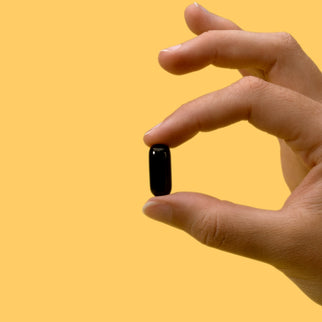Prenatal and postnatal vitamins serve as nutritional safety nets for expecting and new mothers during an exciting, yet demanding period in their lives. Although their primary purpose is to fill any nutritional gaps in the mother's diet, they play distinct roles during pregnancy and post-birth recovery.
Prenatal vitamins, taken during pregnancy, focus on supporting the healthy growth and development of the baby. On the other hand, postnatal vitamins aim to aid the mother's recovery after childbirth while catering to the increased nutritional demands of breastfeeding.
The importance of ensuring that you’re getting enough nutrients while pregnant or breastfeeding can’t be overstated — both you and your newborn will need an abundance of certain vitamins and minerals for optimal health. In this article, we’ll dive into the basics of what you need about prenatal and postnatal nutrition.
What Are Prenatal Vitamins?
Navigating the labyrinth of pregnancy can seem daunting. Every decision carries the weight of two – you and your baby-to-be. Among the many important choices to make is understanding what nutrients are essential to you and your growing baby's health — and this is where prenatal vitamins come into play.
Prenatal vitamins are uniquely formulated multivitamins that ensure that both expectant mothers and their developing babies receive nutrients that might not be adequately supplied by their diets. These nutritional powerhouses contain key vitamins and minerals essential for healthy fetal development and overall maternal health.
In essence, prenatal vitamins are specially tailored to meet the demanding needs of pregnancy and promote healthy fetal development. It’s important to note that they’re designed to complement a balanced diet, not replace it.
What Nutrients Should You Look for in a Prenatal Vitamin?
To make sure that you’re using a prenatal vitamin that features the most important nutrients, let’s take a closer look at some of the essential ingredients:
- Calcium: This mineral is critical for your baby's bones, teeth, heart, nerves, and muscles, but don't forget about yourself. During pregnancy, if you're not consuming enough calcium, your body will compensate by borrowing from your own bone reserves, potentially affecting your long-term bone health.
- Choline: Choline is often one of the unsung heroes in prenatal vitamins. This essential nutrient plays a substantial role in your baby's brain development and supports an overall healthy pregnancy. While your body does produce some choline, it's generally not sufficient during pregnancy, often making additional supplementation necessary.
- Folic Acid (Vitamin B9): This B vitamin, also known as folate, has superstar status in the world of prenatal health. It’s vitally important in supporting the healthy development of your baby's brain and spine. Its role is so significant that healthcare professionals recommend women start taking folic acid even before they become pregnant.
- Iodine: Iodine is essential for your baby's brain development and for maintaining your own thyroid function. An adequate supply of iodine during pregnancy can help support cognitive and developmental health in your baby.
- Iron: During pregnancy, your body's blood supply increases to deliver oxygen to your baby, and iron is essential to this process. An iron deficiency can lead to certain complications, hence the need for adequate iron intake.
- Vitamin C: Known for its immune-supporting properties, vitamin C plays a far more pivotal role in pregnancy. It supports the healthy production of collagen, a protein necessary for forming skin, tendons, ligaments, and blood vessels in both you and your baby.
- Vitamin D: Often overlooked but vitally important, vitamin D is necessary for your baby's bone and teeth development.Proper levels of vitamin D can support an overall healthy pregnancy and healthy fetal development.
Pregnancy is a journey of love, growth, and sometimes, a little confusion. With the right information and resources like prenatal vitamins, you can help ensure that you and your baby are getting the necessary nutrients to thrive during this beautiful journey together.
What Are Postnatal Vitamins?
Just as prenatal vitamins provide tailored nutritional support during pregnancy, postnatal vitamins play an equally significant role in the period following childbirth. This often-overlooked chapter is an essential time of recovery and growth for both mother and newborn, especially if breastfeeding. During this period, the mother's nutritional needs are unique and are catered to by postnatal vitamins.
Postnatal vitamins are specially designed multivitamins that address the nutrient needs of a new mother, aiding in recovery after childbirth and ensuring optimal nutrition during breastfeeding. Just as pregnancy is a demanding period, so is the postnatal period, especially with the added nutritional demands of breastfeeding.
What Nutrients Should You Look for in a Postnatal Vitamin?
Now, you might be asking, "What's special about postnatal vitamins? How do they differ from prenatal ones?" While there are benefits to taking prenatal vitamins after giving birth, there are a few additional nutritional gems that you should focus on post-pregnancy:
- Cobalamin (Vitamin B12): This vitamin is critical in aiding the development of your baby’s brain and nervous system. If you're breastfeeding, your baby gets vitamin B12 from your breast milk, so it's important that your levels are high enough to meet both your needs and those of your baby.
- Vitamin A: Known for its role in eye health, vitamin A is also vital for cell growth, immune function, and skin health. For breastfeeding mothers, adequate vitamin A is necessary to support the infant's rapid growth and immune function.
- Vitamin E: This antioxidant powerhouse aids in protecting cells from damage. Vitamin E is also important for immune function and DNA repair, providing essential support for the physical recovery process post-childbirth.
- Zinc: Essential for proper wound healing, immune function, and cell growth, zinc plays an important role in the postnatal period. Furthermore, it's crucial for the development of your baby's immune system.
What Are the Benefits of Pre and Postnatal Vitamins?
Postnatal vitamins are more than just a continuation of prenatal vitamins — they are an investment in both the mother's and baby's health during the postpartum period.
During breastfeeding, the baby draws a significant amount of nutrients from the mother,and postnatal vitamins help meet these increased nutritional demands. They ensure that the baby continues receiving necessary nutrients like vitamins A, D, and B complex that promote healthy growth and development.
But these vitamins are not just for the baby — they have significant benefits for the mother, too. They help replenish depleted nutrient stores, support energy levels, and support overall cognitive function and emotional wellness. Postnatal vitamins can also be beneficial for non-breastfeeding mothers, as they contain a range of key nutrients that can support overall wellness.
Maintaining a robust vitamin intake in the postnatal period also sets the foundation for long-term maternal health. A well-nourished body recovers more efficiently, making the transition into this new phase of life a bit smoother. Therefore, continuing to take these vitamins post-pregnancy can significantly contribute to the mother's overall well-being while ensuring the baby's healthy development.
Why Is Omega-3 Important in Both Prenatal and Postnatal Vitamins?
The conversation surrounding prenatal and postnatal vitamins often revolves around vital nutrients such as iron, calcium, folic acid, and a spectrum of the vitamins listed above. However, omega-3 fatty acids — specifically DHA and EPA — deserve equal attention for their paramount role in both maternal and fetal health.
Omega-3 fatty acids, particularly DHA (docosahexaenoic acid) and EPA (eicosapentaenoic acid), play a crucial role in the development of your baby's brain, nervous system, and eyes during pregnancy. Their importance continues in the postnatal period, especially if breastfeeding, as these crucial nutrients are delivered to the infant through breast milk, supporting ongoing brain and eye development.
What Should You Know About Sources of Omega-3?
Not all omega-3 sources are created equal. Most plant-based sources, such as flaxseeds and chia seeds, primarily provide ALA (alpha-linolenic acid), a precursor to DHA and EPA. The human body can convert ALA to DHA and EPA, but the process is inefficient and often inadequate. Therefore, direct sources of DHA and EPA are highly recommended, especially during the critical periods of pregnancy and postnatal care.
iwi life delivers omega-3 fatty acids in their most effective form — directly as DHA and EPA—using a sustainable, chemical-free process. Derived from algae, our omega-3 products deliver superior bioavailability, ensuring that you and your baby receive the maximum benefits.
iwi life's algae-based omega-3 supplements are derived from Nannochloropsis. This specific selection of algae is sustainably farmed in desert ponds, harnessing salty water from underground, unused aquifers. This unique approach ensures an eco-friendly and resource-preserving process, aligning with iwi life's commitment to sustainability.
The Bottom Line
We've traversed the importance of prenatal and postnatal vitamins, highlighting the essential nutrients that support both the mother and baby's health during these vital phases. Omega-3 fatty acids, specifically DHA and EPA, have emerged as key contributors, supporting fetal brain development and maternal health.
In the journey of plant-based nutrition, iwi life's innovative approach provides an effective and sustainable source of these crucial omega-3 fatty acids. Our commitment to sustainability and wellness proves that careful nutritional choices can support not just individual health, but the health of our planet too.
As we understand more about the critical role of nutrition in prenatal and postnatal stages, let's champion choices that nourish us while respecting the world we live in.
Sources:
Prenatal Vitamins: Why They Matter, How to Choose | Mayo Clinic
Calcium in Pregnancy | American Pregnancy Association
Choline: Exploring the Growing Science on Its Benefits for Moms and Babies | NCBI Bookshelf
The Importance of Adequate Iodine During Pregnancy and Infancy | NCBI Bookshelf
Iron Nutrition During Pregnancy | PMC
How Much Vitamin C Do You Need During Pregnancy? | What To Expect
Vitamin D and Pregnancy | American Pregnancy Association
Postnatal Vitamins While Breastfeeding | American Pregnancy Association
Vitamin B12 | Breastfeeding | CDC
Vitamin A Supplementation for Postpartum Women | PMC
Vitamin E - Drugs and Lactation Database (LactMed®) | NCBI Bookshelf
Zinc - Drugs and Lactation Database (LactMed®) | NCBI Bookshelf
The Physiological Basis of Breastfeeding | NCBI Bookshe



















